Alopecia Hair Loss
Home » Conditions » Alopecia Hair Loss
Award winning dermatology service, with over 20 years on experience
Short waiting lists, on some occasions offering same week appointments
Safe environment, in Care Quality Commission approved facilities
Hair loss dermatologist Treatments Include:
Advice from our hair loss dermatologists
Hair loss can occur for many different reasons and it is a very common and distressing problem. At Stratum Clinics, we know just how troubling it can be to lose one’s hair. The most important step is to firstly establish the cause for your hair loss, and then, provided it is treatable, to try and reverse it.
If you are suffering from hair loss, the sooner you seek treatment the better results will be, and no amount of hair loss is too small to seek advice about. Our experts at Stratum Clinics are able to diagnose your hair loss and to treat it in the most effective way for you.
Alternative names: male/female pattern baldness, alopecia, alopecia areata, scarring/cicatricial alopecia, pseudopelade (of Brocq), folliculitis De Calvans, dissecting cellulitis, telogen effluvium.)
WHAT CAUSES HAIR LOSS?
Hair loss can happen for many reasons and progress in a variety of patterns. You may have noticed a patch of baldness that has begun to grow, or a receding hairline at your temples or forehead and decided to do something about it before it gets any worse. Or, you may have noticed an increase in hairs on your pillow or clothes, indicating that you are shedding hairs at an increased rate, even if there is no visible thinning of the hair. Whatever concerns you have about your hair or scalp, our experts at Stratum Dermatology Clinic are here for you. Every case is unique and we provide each patient with personalised specialist care and treatment to achieve the best results possible, whatever the cause.
What Are The Main Types Of Hair Loss?
SCARRING ALOPECIA
Scarring alopecia results in permanent hair loss, so it is really important for early diagnosis and treatment to slow down the adverse effects.
In scarring alopecia, hair follicles become inflamed and are replaced with scar tissue on the skin on the scalp. For this reason, when hair loss has occurred, there is no potential for the hair to recover in those areas. Although this process is irreversible that does not mean these conditions are untreatable. As is often the case, early diagnosis and treatment is vital to limiting the damage caused by the disease. The scarring alopecias require careful and expert management as an accurate diagnosis of the problem is vital to choose the most appropriate treatment. Sometimes a diagnosis requires a skin sample (biopsy) of the skin.
NON-SCARRING ALOPECIA
MALE PATTERN HAIR LOSS
By far the most common cause of hair loss in men is male pattern hair loss (MPHL). This condition is also referred to as androgenetic alopecia. Although scientists are not completely certain what determines who gets male pattern hair loss, we do know there is a genetic component to the condition that can be inherited from either parent’s side of the family.
Male pattern hair loss is identified by the hair it affects. In male pattern baldness, hair on the top of the head is affected, whereas hair on the back and sides of the scalp is spared. MPHL generally progresses in one of three ways; a receding hairline, thinning of the hair on the crown, or a general thinning of the hair all over the top of the head.
The key is to catch it as early as possible, ideally, as soon as you notice any thinning or loss of hair, the sooner you can begin treatment the greater your chance of achieving a good recovery. If you think you may be suffering with male pattern hair loss, make an appointment with our expert dermatologists today.
FEMALE PATTERN HAIR LOSS
Female pattern hair loss, also sometimes called androgenetic alopecia, affects thousands of women in the UK, usually beginning at around 30 years of age and occasionally earlier. Typically, women present with gradual thinning of the hair at the top of the head and widening of the hair part. Despite similarities with male pattern hair loss, the exact causes of FPHL is less clear. Elevated levels of testosterone or increased sensitivity to the hair follicles to this hormone is a factor in some, but not all, who have this condition. The balance of other hormones in the body and genetic factors are also likely to be important in causing this hair loss.
A number of treatments are clinically proven to stop further hair loss and in many cases reverse it, leading to a recovery of hair thickness and coverage. As with MPHL, early treatment is important as it is much easier to maintain the hair density than to recover it once it has been lost.
ALOPECIA AREATA
Alopecia Areata (AA) is a form of hair loss that affects both men and women causing bald patches to suddenly appear on the scalp or body. This happens when groups of hair follicles prematurely enter the shedding phase of the hair cycle. It is thought to be an autoimmune disorder, where the body’s immune system attacks the hair follicle root by mistake. We do not know what causes a person to develop AA, but a variety of potential triggers have been identified including infections and severe emotional stress.
Treatment for alopecia areata depends on the site and size of the affected areas. Steroids can be used either topically or as injections into the scalp to reduce the immune response and allow the hair to regrow. Larger areas are treated with topical treatments such as diphencyperone immunotherapy or dithranol and sometimes tablets can be used. Patches can also regrow by themselves, although there is no way of predicting if or when this might happen. Since AA can appear suddenly and progress rapidly, early treatment is generally recommended to increase the chances of a recovery.
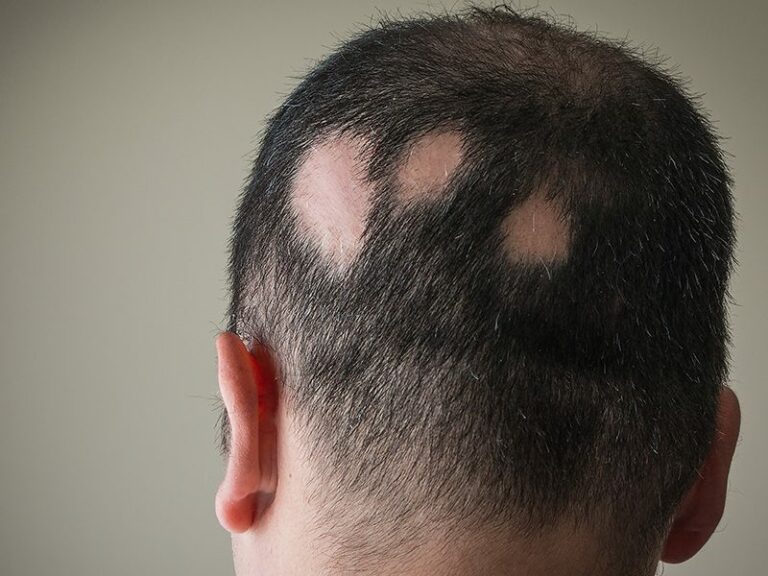
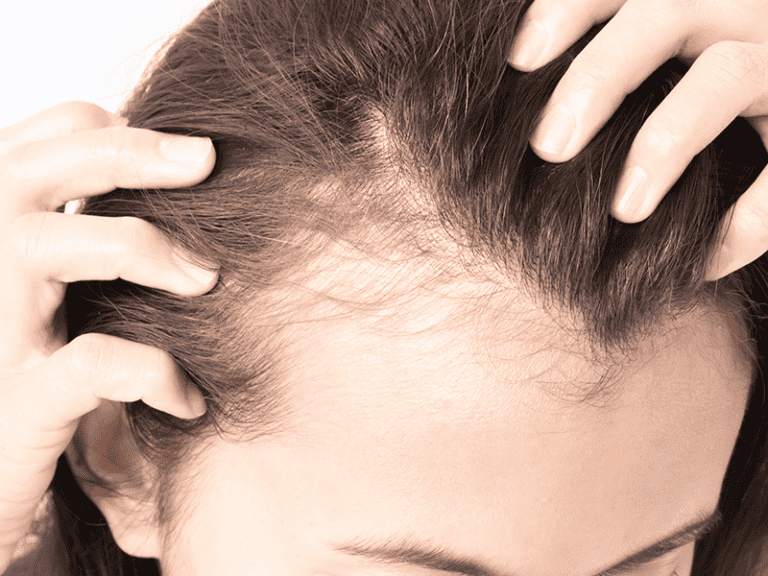
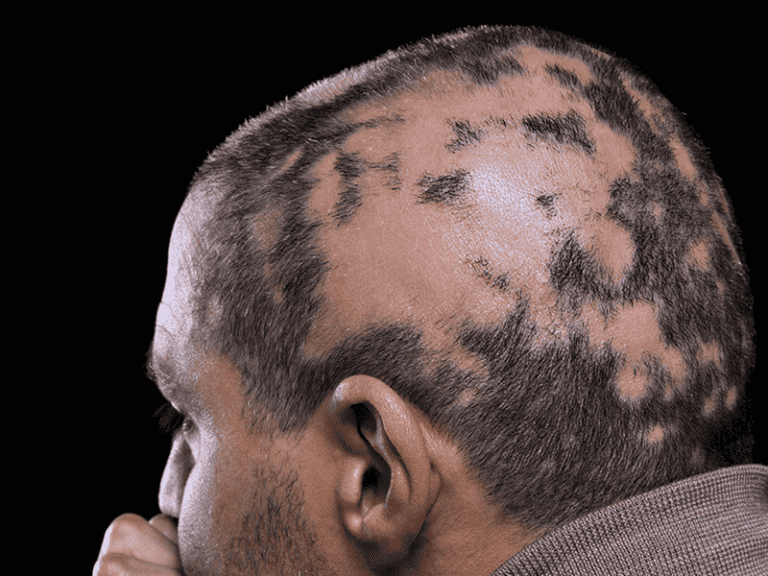
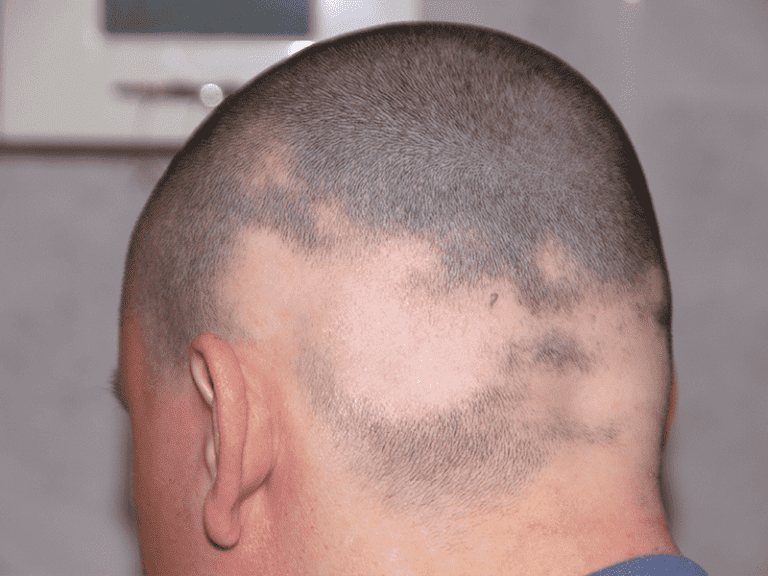
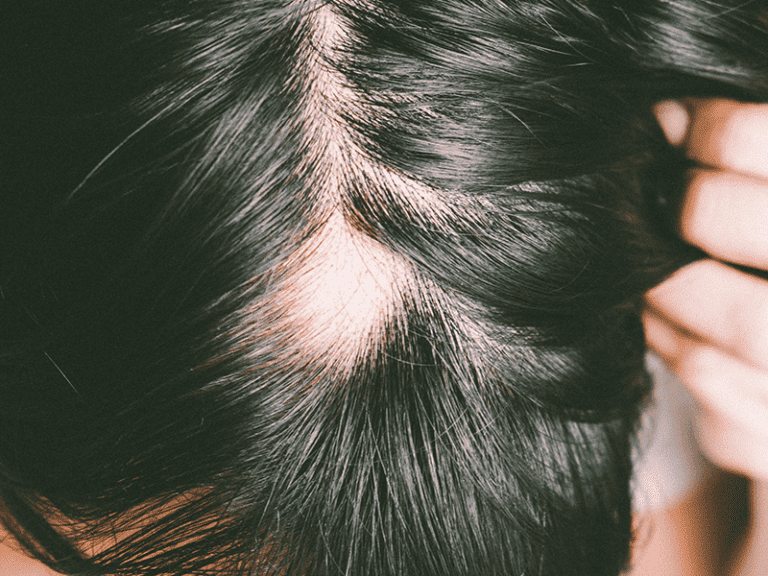
HOW CAN HAIR LOSS BE TREATED?
The most important part of treatment is to make the correct diagnosis. Stratum consultants are fully qualified with the right experience to diagnose the cause of hair loss. Diagnosis involves a consultation, full scalp examination and sometimes blood testing to establish if there is a deficiency or hormonal problem. If scalp disease is present or a diagnosis is not straightforward, a scalp biopsy might be undertaken to examine the process at a microscopic level.
The key to treatment is establishing if the condition is scarring or not. If it is scarring, it is important to switch off the process as quickly as possible to prevent progression, as scarred areas will not regrow. Non-scarring alopecia can recover fully with treatment but may gradually progress over time. It is vital to make the correct diagnosis and prevent any scarring, or alopecia can become irreversible.
FREQUENTLY ASKED QUESTIONS
WHAT IS ALOPECIA?
Alopecia and hair loss mean the same thing; reduction in hair density and increased hair fall. This can be a diffuse process or occur in localised areas on the scalp or other areas of the body. It can occur slowly over many years, or be rapidly progressive, occurring over days or weeks. There are many causes for alopecia which can broadly be grouped into three categories: internal deficiencies, scalp disease or ‘other’ causes. The most important distinction is whether scarring is a feature or not, because this will dictate how successful treatment can be.
WHAT DOES ALOPECIA LOOK LIKE?
Hair loss may be diffuse (i.e. androgenic) or localised (i.e. alopecia areata). If there is scarring, the skin might be featureless with loss of hair follicles and pigment.
HOW MIGHT ALOPECIA AFFECT ME?
The degree of psychological stress caused by alopecia is usually related to the extent of alopecia and the ease (or lack thereof) with which the condition can be covered or hidden.
For further information on alopecia, see the British Association of Dermatologists websites patient information pages:
WHAT IS THE MAIN CAUSE OF ALOPECIA?
Alopecia is an autoimmune disease, meaning cells in your immune system attack your hair follicles causing your hair to fall out.
REQUEST A CALL BACK
Please fill in this form and one of our team will give you a call back to arrange a consultation with one of our expert dermatologists.

HEAR FROM OUR PATIENTS
WHY CHOOSE STRATUM DERMATOLOGY CLINICS AS YOUR hair loss dermatologist?
During your consultation at Stratum Dermatology Clinics, your condition will be assessed by a consultant hair loss dermatologist and all suitable treatment options will be discussed with you. To book an hair loss consultation in one of our clinics, give us a call or fill out the online booking form and we will call you back.
We work with leading experts in the field of dermatology to ensure you have the best experience and treatment. Stratum Clinics are regulated by the Care Quality Commission, are part of the British Association of Dermatologists and are top rated by patients on Doctify. Both Stratum Dermatology Clinics and the consultants who work here are recognised by the main healthcare insurance providers.
latest INSIGHTS AND ADVICE

Guide to Fall Skin Conditions
Autumn, with all its stunning colours, also brings some challenges for our skin. As the air gets cooler and the leaves turn vibrant shades, it’s a reminder that we’re steadily approaching winter. Keeping your skin glowing and healthy during this transition from summer to the
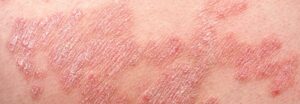
Eczema Awareness Month – Complete Guide on Eczema
October is Eczema Awareness Month. For individuals living with eczema, you will be all too familiar with the trials of handling this skin complaint. It’s our mission throughout October and beyond to educate, support and empower you by delivering invaluable insights on its origin, available

Understanding Varicose Veins: Symptoms, Treatments and Prevention
Varicose Disease Awareness Month focuses on raising awareness about varicose veins, a common but often ignored condition affecting millions globally. This September, we’re highlighting the importance of early detection, available treatments and lifestyle changes to effectively manage varicose veins. By increasing awareness, we aim to






